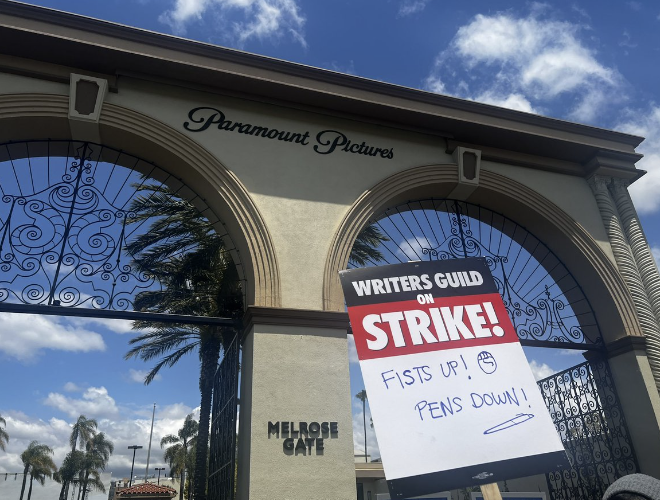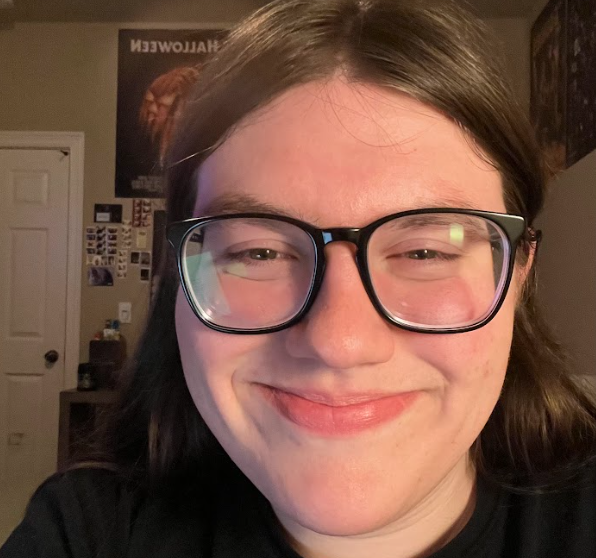Writers strike for equal pay
What the recent WGA strike means for current and upcoming series and movies, and how it can protect future generations of writers.
Following the strike, tons of creative signs have been posted and praised online. Some examples are, “A.I. this sign wrote” poking fun at A.I.’s spotty and flawed writing abilities, “Pay your writers or we’ll spoil ‘Succession’,” and “Hey Amazon, free delivery is your job, not ours!”
June 11, 2023
On May 2, 11,500 members of the Writers Guild of America (WGA) went on strike in Los Angeles, advocating for fair pay. The last time this happened was in November of 2007, where writers stood their ground until February of the following year. Both strikes hold the same intentions, and hope to grant writers the respect they deserve.
What is the WGA asking for?
Writers have been struggling with fair distribution and pay for a long time. Despite being such a fundamental piece of television and film production, they are constantly overlooked. According to the WGA, almost 50% of writers are being paid the minimum rate, with a 14% decrease in pay within the last five years. Many of the writers who are a part of the WGA don’t have additional jobs, and understandably expect to be paid a living wage.
One writer in particular, Kelly Galuska, shared her thoughts on the situation from a mothers perspective.
“Everything’s changed, but the money has changed in the wrong direction,” Galuska said in an interview with AP. “It’s a turning point in the industry right now. And if we don’t get back to even, we never will.” Galuska has been picketing with her three-week-old daughter to support her and her associates’ future.
The WGA wants a re-evaluation of future contracts, and an analysis of how new technology is going to take a toll on their careers.
Streaming
A specific concern in regards to pay is the relationship between writers and streaming services.
TV and streaming both have evolved tremendously since 2007. Companies are now creating their own streaming platforms, regardless if they’re TV oriented or not.
Sites like HBO Max, Hulu, and Amazon Prime Video have now created subscriptions that include live TV. These sites create a much more accessible and cheaper way to watch live television, and is becoming more common within households. Many people don’t realize how harmful this can be for the writers of the shows being offered through these subscriptions.
In an interview with NPR, Paul Hardart, a professor at NYU Stern School of Business, discussed how companies’ priorities have been fit to favor profit rather than employees.
“Today, the streamer is trying to get people to subscribe to their service,” Hardart said. “They’re looking more at the aggregate of the service versus the individual show.”
Additionally, when TV shows are streamed, viewership isn’t always shared properly, which ultimately results in a lack of credit and compensation.
A.I.
Within recent years, many advancements have been made in regards to Artificial Intelligence (A.I.) and chatbots. A.I. can now be used for things such as personal assistants such as Alexa and Siri, writing assistants like Grammarly, and even prompted image generators.
Though most A.I. applications are used for assistance and entertainment, there is a major downside for writers when it comes to its ability to generate a story or script.
A major concern in this category is ChatGPT. OpenAI’s description of this bot reads: “We’ve trained a model called ChatGPT which interacts in a conversational way. The dialogue format makes it possible for ChatGPT to answer follow-up questions, admit its mistakes, challenge incorrect premises, and reject inappropriate requests.”
With the lack of humans involved, the question of who it belongs to is very prominent. To receive the “written by” credit indicates a human was involved in the writing process. In the case of bots, they can only be given the “screenplay by” credit. This brings even more questions; who gets the appointed 75% of residuals? The company? The person who promoted the bot? A.I. writing has caused even more confusion, and neglect of real human writers.
Copyright also plays a huge role. No human can be linked to the “new” work being produced, because they weren’t technically present in the creation of the product. A.I. pulls information from the internet, so everything they do is inspired by someone else’s work. Currently, these bots don’t have the capacity to create original screenplays, and will only continue to steal bits and pieces of other writers’ work.
A.I. is a major concern for the WGA – not necessarily for what it’s doing now, but what it can do to them in the future.
What happens now?
This is the third occurrence of a strike following new technology. 15 years ago, writers were concerned about the relationship between the internet and their projects, and 35 years ago it was how writers would be compensated with the release of CDs.
Whenever new technology is introduced, a strike isn’t too far behind. So far, studios have shown no interest in fixing this problem, and plan to continue ignoring writers. There is no telling how long this will take, but the WGA is determined to fight for what they want.
One phrase that truly summarizes how writers are feeling is “We want careers, not gigs!” Keep an eye on the news and help support these writers in their efforts to protect their rights.



